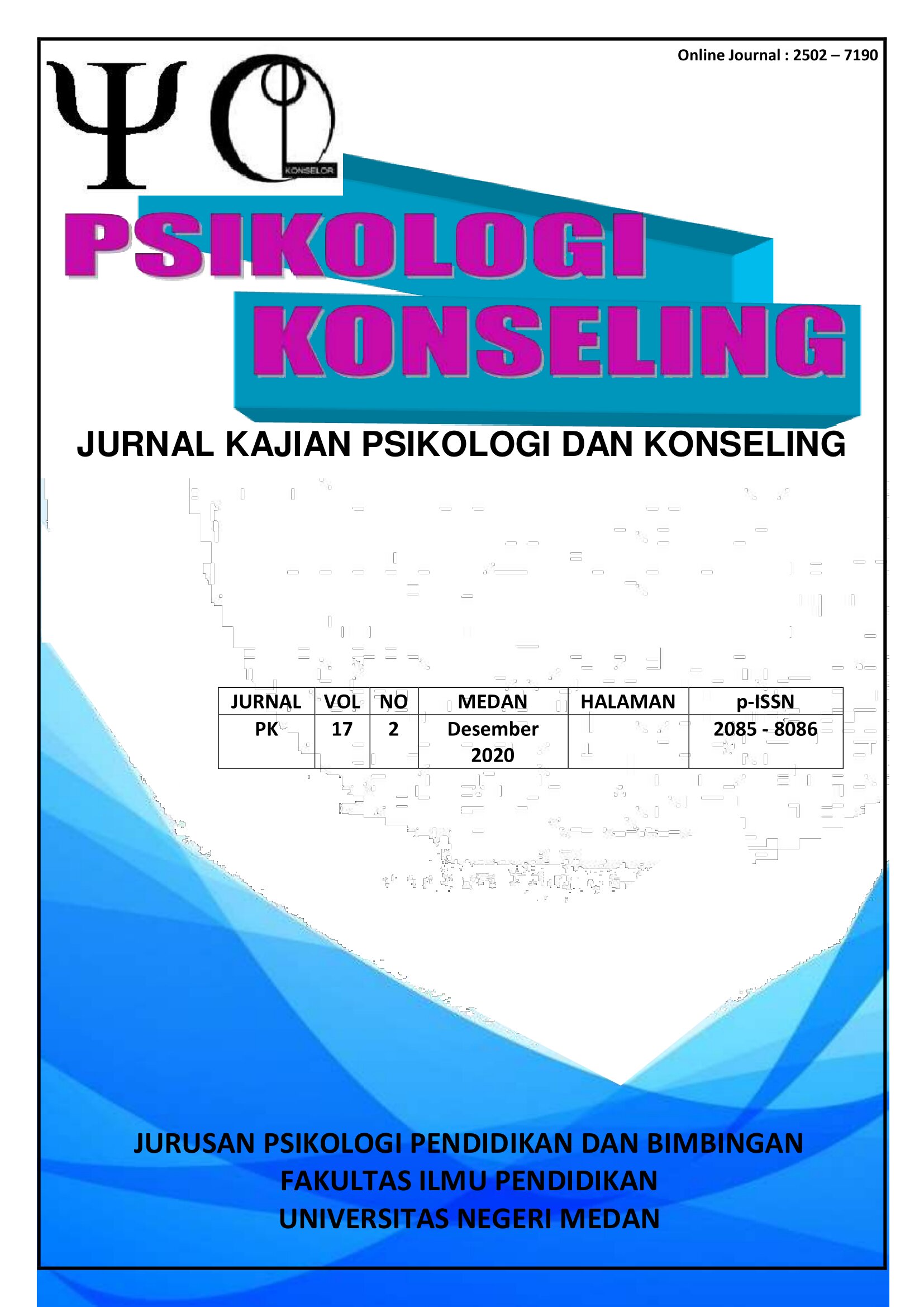ANALISIS KEBUTUHAN WANITA KARIR DI BIDANG PENDIDIKAN ERA MILLENIAL
DOI:
https://doi.org/10.24114/konseling.v17i2.22072Keywords:
Wanita Karir, Era Milenial, Analisis KebutuhanAbstract
Artikel ini bertujuan untuk mendeskripsikan kebutuhan wanita karir khusunya bidang pendidikan di era milenial. Teknologi yang terus berkembang memberikan dampak pada wanita karir dalam menghadapi tantangan pekerjaan dan keluarga. Untuk meningkatkan kinerja, wanita karir membutuhkan skill dan keterampilan yang disesuaikan dengan kemajuan teknologi. Disisi lain, wanita karir juga memiliki tantangan dalam mengurus keluarga terutama dalam mendidik karakter anak. Wanita karir memiliki peran yang strategis dalam mendorong pembangunan yakni sebagai manajer rumah tangga, sebagai pelaku ekonomi dan sebagai perempuan karir. Artikel ini juga menganalisis tantangan yang dihadapi wanita karir dalam melaksanakan perannya di era milenial.Kata Kunci: Wanita Karir; Era Milenial; Analisis KebutuhanReferences
Abalkhail, J. M. 2019. Women™s career development in an Arab Middle Eastern context. Human Resource Development International, 22(2), 177“199. https://doi.org/10.1080/13678868.2018.1499377
Abalkhail, J. M., & Allan, B. 2015. Women™s career advancement: Mentoring and networking in Saudi Arabia and the UK. Human Resource Development International, 18(2), 153“168. https://doi.org/10.1080/13678868.2015.1026548
Ayre, M., Mills, J., & Gill, J. 2013. ˜Yes, I do belong™: The women who stay in engineering. Eng. Stud., 5(3), 216“232.
Blackhurst, A. E., Brandt, J. E., & Kalinkowski, J. 1998. Effects of Career Development on the Organizational Commitment and Life Satisfaction of Women Student Affairs Administrators. Journal of Student Affairs Research and Practice, 36(1), 19“34. https://doi.org/10.2202/1949-6605.1067
Butt, G., MacKenzie, L., & Manning, R. 2012. The career development of recently qualified British South Asian women teachers: œEverybody™s the same. I don™t feel my ethnicity is an issue at all. Educational Review, 64(2), 181“194. https://doi.org/10.1080/00131911.2011.598915
Coogan, P. A., & Chen, C. P. 2007. Career development and counselling for women: Connecting theories to practice. Counselling Psychology Quarterly, 20(2), 191“204. https://doi.org/10.1080/09515070701391171
Cook, E. P., Heppner, M. J., & O™Brien, K. M. 2005. Multicultural and gender influences in women™s career development: An ecological perspective. Journal of Multicultural Counseling and Development, 33(3), 165“179. https://doi.org/10.1002/j.2161-1912.2005.tb00014.x
Danhauer, S. C., Tooze, J. A., Barrett, N. A., Blalock, J. S., Shively, C. A., Voytko, M. Lou, & Crandall, S. J. 2019. Development of an Innovative Career Development Program for Early-Career Women Faculty. Global Advances in Health and Medicine, 8, 216495611986298. https://doi.org/10.1177/2164956119862986
Dixon, W. M., Agarwal, S., Jones, D., Young, B., & Sutton, A. 2005. synthesising qualitative and quantitative evidence: A review of possible methods. Journal of Health Services Research & Policy, 10(1), 45“55.
Ellemers, N. 2014. Women at Work: How Organizational Features Impact Career Development. Policy Insights from the Behavioral and Brain Sciences, 1(1), 46“54. https://doi.org/10.1177/2372732214549327
Gasser, C. E., & Shaffer, K. S. 2014. Career Development of Women in Academia: Traversing the Leaky Pipeline. The Professional Counselor, 4(4), 332“352. https://doi.org/10.15241/ceg.4.4.332
Hariyati, R. T. S. 2010) Mengenal Systematic Review Theory dan Studi Kasus. Jurnal Keperawatan Indonesia, 13(2), 124“132. https://doi.org/10.7454/jki.v13i2.242
Hasiani., F. 2015 Analisis Kualitas Sumber Daya Manusia Dan Pengaruhnya Terhadap Pertumbuhan Ekonomi Di Kabupaten Pelalawan. Jom FEKON Vol., 2(2), 1“15.
Madsen, S. R. 2012. Women and leadership in higher education: Learning and advancement in leadership programs. Advances in Developing Human Resources, 14(1), 3“10. https://doi.org/10.1177/1523422311429668
Makrufi, A. D. 2018. Peran wanita karir dalam pendidikan islam di era digital. Vicratina Jurnal Pendidikan Islam, 2(2), 10“25.
Mozahem, N. A., Ghanem, C. M., Hamieh, F. K., & Shoujaa, R. E. 2019. Women in engineering: A qualitative investigation of the contextual support and barriers to their career choice. Women™s Studies International Forum, 74(December 2018), 127“136. https://doi.org/10.1016/j.wsif.2019.03.014
Ngafifi, M. 2014. Kemajuan Teknologi Dan Pola Hidup Manusia Dalam Perspektif Sosial Budaya. Jurnal Pembangunan Pendidikan: Fondasi Dan Aplikasi, 2(1), 33“47. https://doi.org/10.21831/jppfa.v2i1.2616
Simpkins, S. D., Fredricks, J. A., & Eccles, J. S. 2012) Charting the Eccles™ expectancyvalue model from mothers™ beliefs in childhood to youths™ activities in adolescenc. Dev. Psychol, 48(4), 1019“1032.
Sökjer-Petersen, M., & Thorssell, J. 2008. Women™s view of trust and its influence on entrepreneurship and career development. Nordic Psychology, 60(2), 114“128. https://doi.org/10.1027/1901-2276.60.2.114
Tlaiss, H., & D, K. 2015. œWomen and Training: An Empirical Investigation in the Arab Middle East. Human Resource Development International, 18(4), 366“386.
Wakerkwa, O. 2016. Peranan Manusia Dalam Kabupaten Lanny Jaya Onius Wakerkwa. Jurnal Holistik, (17A), 1“22.
Worth, N. 2016. Feeling precarious: Millennial women and work. Environment and Planning D: Society and Space, 34(4), 601“616. https://doi.org/10.1177/0263775815622211
Yang, A. 2014. Themes in the Career Development of 1.5-Generation Hmong American Women. Journal of Career Development, 41(5), 402“425. https://doi.org/10.1177/0894845313507775
Downloads
Published
How to Cite
Issue
Section
License
Copyright (c) 2020 Anaway Mansyur, Dede Hidayat

This work is licensed under a Creative Commons Attribution-ShareAlike 4.0 International License.
This work is licensed under a Creative Commons Attribution-ShareAlike 4.0 International License.




